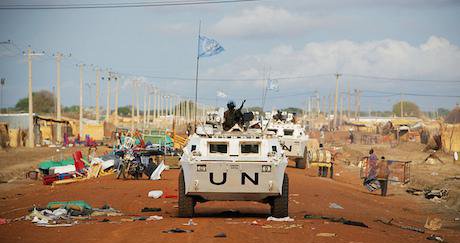
Moreover, as the UN’s 2017 report, ‘The State of Food Security and Nutrition’, noted: “Exacerbated by climate-related shocks, conflicts seriously affect food security and are a cause of much of the recent increase in food insecurity. Conflict is a key driver of situations of severe food crisis and recently re-emerged famines, while hunger and undernutrition are significantly worse where conflicts are prolonged and institutional capacities weak.” Violent conflict is also the main driver of population displacement.
Last year was the 75th anniversary of the founding of the UN Food and Agriculture Organisation. Also last year, the World Food Programme was awarded the Nobel Peace Prize, not only “for its efforts to combat hunger”, but also “for its contribution to bettering conditions for peace in conflict-affected areas and for acting as a driving force in efforts to prevent the use of hunger as a weapon of war and conflict”. The announcement also noted: “The link between hunger and armed conflict is a vicious circle: war and conflict can cause food insecurity and hunger, just as hunger and food insecurity can cause latent conflicts to flare up and trigger the use of violence. We will never achieve the goal of zero hunger unless we also put an end to war and armed conflict.”
As COVID-19 exacerbates inequalities, more people are becoming food insecure – in poor and rich countries alike. According to the UN’s 2020 report, ‘The State of Food Security and Nutrition in the World’, almost 690 million people went hungry in 2019 and COVID-19 could push more than 130 million more people into chronic hunger. That means one in every nine humans going hungry most of the time.
Fund peacekeeping, not warmongering
The research group, Ceres2030, has estimated that to reach the SDG’s zero hunger goal by 2030, $33bn per year is needed, with $14bn coming from donors and the rest from affected countries. A 10% annual redirection of military spending would have a significant effect on this area. It would also help to ease conflicts if it was redirected towards increasing the UN’s peacekeeping budget from $6.58bn for 2020-2021.
Furthermore, work could begin to redeploy the armed forces to become national and international disaster preparedness and rescue forces. Their logistical skills have already used in distributing vaccines in the UK. After retraining in collaborative skills, they could share this knowledge with other nations, which would also help to calm tensions.
There is now an overwhelming case for think tanks, academics, governments and civil society in general to look at what kind of scenarios will help us reach 2050 and 2100 without destructive wars. The global challenges thrown up by climate change, biodiversity loss, growing inequality and further pandemics are quite enough without the violence of war to help them along.
Real defence spending ensures that everyone can eat well, no one lives in poverty, and the destabilising effects of climate change and loss of biodiversity are halted. We need to learn how to build and maintain cooperation with others while dealing with the tensions between nations diplomatically.
Is it possible? Yes, but it requires a fundamental change in the way that security is currently understood.
This post was originally published on Radio Free.

